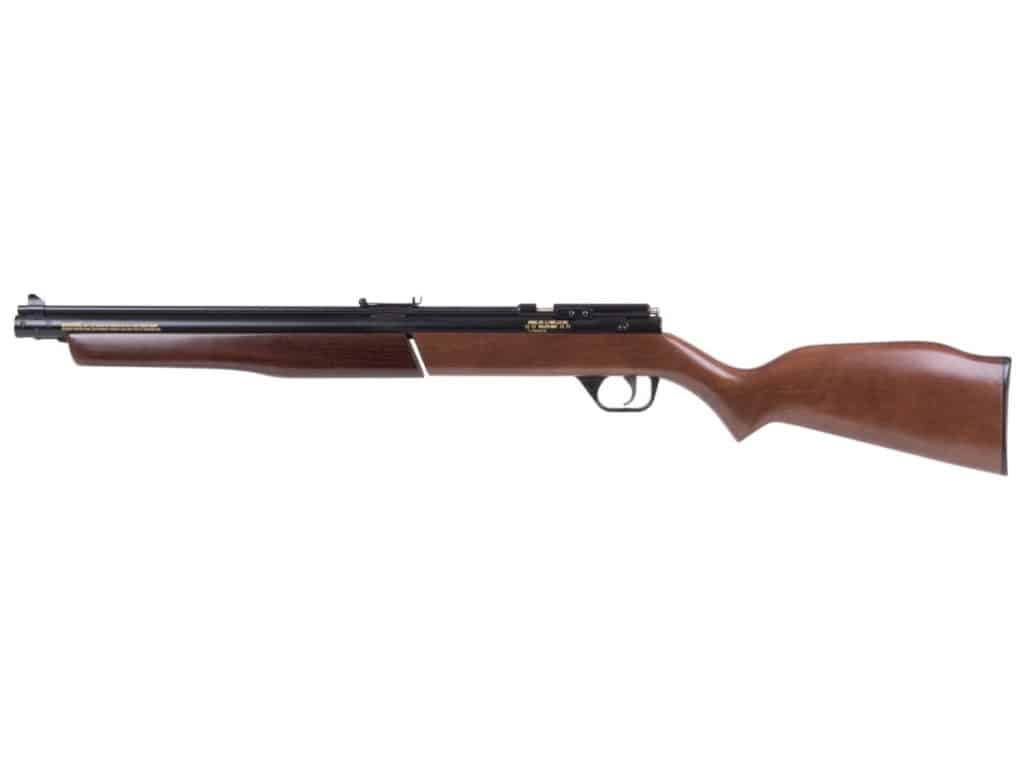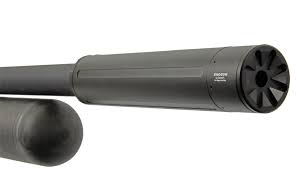Shooting an air rifle in the backyard comes with lots of fun and advantages. One thing may worry you most though – if it broke the sound barrier. So, you are probably asking this question: can an air rifle break the sound barrier?
Generally, an air rifle can break the sound barrier but this depends on which type and caliber of air rifle you are shooting. Some air rifles have pellet speeds over 1200 fps which is faster than the speed of light. As a result, the air rifle causes a loud sustained crack.
Usually, you can only achieve this feat if you are using lightweight target pellets that are made of lead alloy. Heavier pellets will not overpass the speed of light hence no breaking of the sound barrier. At supersonic speed, pellets are unstable and thus inaccurate.
Let’s divide this topic further in the next section:
Can an Air Rifle Break the Sound Barrier?

Actually, any air rifle that can shoot pellets to a velocity in the region of 1150 fps and above will break the sound barrier. With that being said, everyone can point out that the type and particularly the caliber of an air rifle determines if it breaks the sound barrier or not.
Of all the calibers, the .177 air rifles seem to carry the day when it comes to this phenomenon. The standard .177 pellets are lightweight thanks to the lead alloy material they are made from.
The moment you break the sound barrier, there is a loud crack you will hear as the pellet leaves the muzzle. with this noise, your shooting activity in the backyard is probably going to be jeopardized thanks to your safety and neighbors that love peace.
The biggest problem with such air rifles is accuracy. A pellet traveling at supersonic speed is quite unstable and unpredictable – it doesn’t have a straightforward flight and this right here is a bad thing.
Any airgunner, whether new or old, needs a predictable pellet path that supersonic and transonic speeds don’t offer. To remain accurate and consistent with your shots, you’d be better off if the pellet stayed below the speed of sound, subsonic speed.
The subsonic speed allows pellets to travel in a more controlled fashion and is well stabilized. The result is more accurate consistent shots are achieved giving you higher chances of hitting your target.
It’s important to know that for the most part, higher calibers of air rifles will not break the sound barrier. For some reason, a larger caliber like .25 or .50 sport heavier pellets that cannot travel at lightning speeds unless they are very powerful. And this is good for better accuracy.
Why Is It Illegal to Break the Sound Barrier?
While breaking the sound may sound fun for adventurous airgun newbies, it’s not cool in many ways. One of them being the loud sound that’s emitted. If you will not worry about the noise, at least your neighbor will.
For that reason, it’s illegal to break the sound barrier in the United States. A sonic boom resulting from shooting an air rifle that breaks a sound barrier is dangerous to the safety and health of the people. Heart damage and hearing loss are the palpable consequences you are likely to suffer.
The law strictly protects the general public from any instances of such events – whether it’s coming from aircraft planes or an air rifle. So you must adhere to the set regulations to stay on the right side of the law.
With that being said, you’d need to get isolated somewhere far away from the residential areas to carry out your experiments on breaking the sound barrier.
How Loud Are Airguns?
If you consider what amount of noise the real firearms produce when shot, you’d never imagine an air rifle is anywhere closer. To some extent, that’s a true assumption because gunshots can sound in the range of 132 dB to 183 dB; this is simply dumbfounding.
So, how loud are airguns? Depending on the type and caliber, an airgun can produce noise between 74-90 decibels. This is way lower than the sound from a bullet but can cause problems to the shooter and their environs.
For guys chatting in an office space, the conversation is usually about 60 decibels. If you hear a train whistle 500 feet away, that’s 90 decibels of sound. Don’t mistake the fact that there are some air rifles that are quieter than 74 decibels and many more others that are louder than 74 decibels.
If you are looking for a quiet air rifle, the Benjamin Marauder Woodstock air rifle (Amazon Link) is a perfect place to start experiencing your backyard peace as you shoot.
(Amazon Link) is a perfect place to start experiencing your backyard peace as you shoot.
Unwanted noise is a nuisance in air rifles and you could be wondering where it emanates from. First, you need to understand that compressed air that’s released at the muzzle is one big reason for most air rifles.
Then when it comes to pellets, the speed of lighter pellets can cause a lot of noise when an airgun is shot. And if you are cleaning your air rifle with petroleum-based products, you should definitely not be surprised if next time it shoots louder.
Is .177 or .22 Quieter?
Whether you are shooting in the yard of your home or hunting for varmints, a quiet air rifle is going to be a real goldmine. You cannot afford to bring commotion and be clouted by neighbors or scare your prey off in the event of loud shots.
Talking about loud shots, is .177 or .22 quieter? In general, the .22 caliber air rifle is quieter than the .177. The explanation behind this lies in the fact that .22 air rifles shoot heavier pellets that do not travel at frightening speeds to break the sound barrier and produce a sonic crack in the process.
That’s, unfortunately, the case of the .177 counterparts. Usually, .177 air rifles shoot lightweight pellets that travel at a supersonic speed. At that moment, a loud crack of sound is heard to indicate the sound barrier has been broken.
If you didn’t take care of the problem noise, your neighbors will not take it lightly. And if you are trying to eliminate the notorious squirrels in your backyard, they might as well have found a proper caution to hide and never come out until their threat is out of sight.
The good thing about modern-day’s air rifles is that most of them are quiet-ready. Manufacturers have started integrating noise-suppressors and other noise-reduction technologies into their models that shroud the barrels to cut out the report an air rifle makes.
Are Suppressors Legal on Pellet Guns?
Considering the fact that some airguns break the sound barrier that easily, it would be wise to look for ways to avoid this from occurring. One of the ways is to use suppressors to lower the report a particular gun will produce even if it has the speed to break the sound barrier.
But are suppressors legal on pellet guns? As a whole, modern air rifles come with integrated suppressors which are non-removable. Hence, they can be deemed legal in that context. However, if you need a suppressor, you must acquire a license for the ownership, or else the law is not going to favor your judgment.
Generally, the situation surrounding the ownership of silencers for airguns is a bit complex. While the law permits for almost unrestricted ownership of air rifles, silencers can be tricky.
The problem here is that you may buy a silencer or suppressor for your pellet gun but still double it up for use on real firearms. And that’s where things start going the wrong way.
Rather than being entangled in this confusion, the best way to go about it is to follow the due process of owning a suppressor. Don’t assume because you bought it for your airgun, that’s all – you may need to buy a license for it alone.
A perfect suppressor features this DonnyFL silencer that is not only effective but also improves your airgun’s appearance.
that is not only effective but also improves your airgun’s appearance.

What is the Sound Barrier FPS?
One of the biggest mistakes you want to avoid at all costs is buying an air rifle based on the speed performance alone. Velocity cannot be an absolute marker for high performance.
So what’s the sound barrier fps? Normally, sound travels at a speed of 1125 feet per second. This is what’s called the sound barrier.
If your air rifle hits this speed or surpasses it, the sound barrier is said to have been broken. You break the sound barrier in the 1940s and you are a special person because back then it was a really overhyped achievement.
If the object or pellet exceeds the speed of sound by five times, that’s called hypersonic speed. In case it comes close to reaching the 1125 fps, that’s called transonic and it’s called subsonic if the pellet speed is not too high but just enough.
Final Thoughts: Can an Air Rifle Break the Sound Barrier?
Generally, an air rifle can break the sound barrier. The speed of sound stands at 1125 fps. Modern air rifles can produce pellet speeds up to 1600 fps.
If the sound barrier is broken, you hear a loud sonic crack as the pellet is shot. Breaking the sound barrier was a really special thing in the old days but today, it’s in fact a huge drawback for airgunners looking to have it quiet and accurate.


